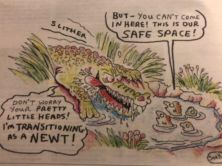Okey Ifionu, deputy managing editor of a Nigerian newspaper, commented about making the decision to publish a controversial story. (Credit: DailyIndependent)
Nigerian newspaper The Daily Independent published an analysis about “coping with the demands of responsive journalism.”
According to the Independent’s analysis, a common but serious journalism issue in Nigeria is making the tough decision of whether or not to publish a story. “There is hardly any journalist in Nigeria who would not confess that the practice of the profession in their country is a tough one. And this reality of the tough challenge every journalist encounters in the discharge of his duties in Nigeria was made most evident on Monday, January 25.”
In that Jan. 25 case, an unnamed journalist living in a southwestern Nigerian state had uncovered election law violations, but had to decide whether to publish a story. While the story is significant, the possible results of publishing could be political repercussions or threats of attack.
As the Independent commented, the journalists’ “friends and loved ones” were against any journalist writing the story because: “They believe that if other journalists should write the story that political thugs and hoodlums, working for the politicians responsible for the anomalous registration, would descend on journalists living near the vicinity, and attack them, believing that they were the ones that had informed journalists from other locations to write the story.”
The unnamed journalist with the elections violation scoop ended up not writing the story, according to the Independent, which considers that case to be common.
“Studies show that this situation is replicated in the lives of many journalists at all levels and many locations across the country. And at many forums, it has become a subject of discussion, where the old journalism cliché of ‘publish and be damned’ was widely used.”
Likewise, Leke Alder of Alder Consulting called the decision to publish “a serious one for an average Nigerian journalist.” Alder, who commented that journalists should be exposing secrets, further stated:
“The journalist faces a moral challenge in -his social life; his moral challenge is in turn an ethical challenge. If he publishes he gets damned. If he fails to publish, he gets damned.”
Okey Ifionu, deputy managing director of Nigerian newspaper, ThisDayLive, commented on publishing decisions:
“For me, I would think that it depends on what you are publishing. You have to weigh the options. If what you will publish will plunge the nation into a civil war, you should not publish that. But if you do not want to publish because you do not want Mr. President to feel angry, then you are doing a disservice to the nation rather than serving it.”
iMediaEthics has written to the Independent and Alder for more information and will update with any response.





